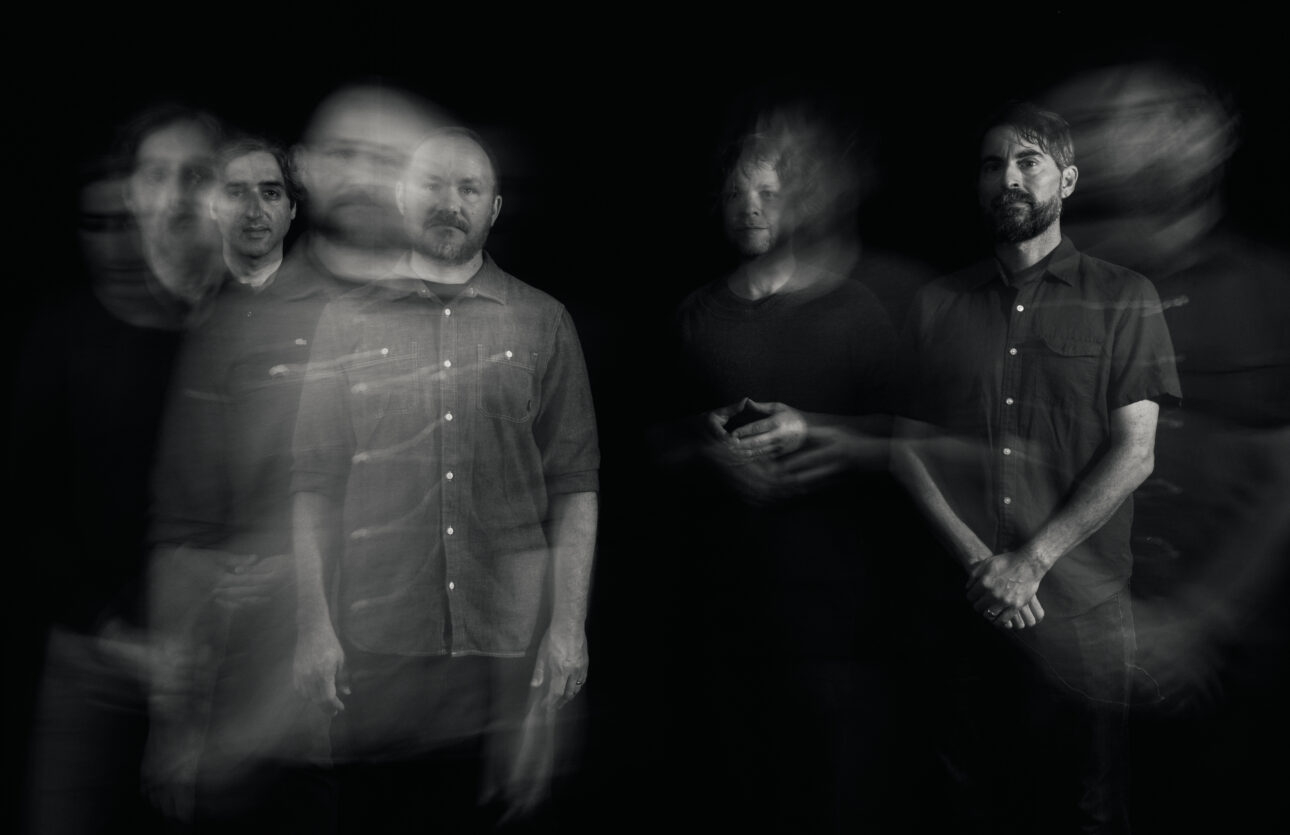When Explosions In The Sky announced a new tour this spring, fans panicked. It’s easy to see why—bold lettering proclaimed “THE END TOUR,” and the only other information given was dates and on-sale times. It wasn’t until July that the band eased the tension by announcing a new album entitled End, accompanied by a press release noting, in its last line, that it would be the band’s “seventh, but not final, studio album.”
“Obviously when we came up with that we knew people were gonna think that we were breaking up,” says drummer Chris Hrasky over Zoom. “But it wasn’t a statement of, ‘We have finished our work here and we are now changing.’ Everyone’s been in this awful nightmare for the last several years, and I think of the title almost as a pleading, ‘Can this just end, please?’ It definitely isn’t this apocalyptic statement.”
Since forming in Austin in 1999, EITS have been no strangers to dramatic gestures, but usually, those come in the form of instrumental climaxes led by tremolo-picked guitars and marching band snare patterns. By the time they scored Peter Berg’s 2004 film Friday Night Lights, they won an Austin Film Festival Award in 2000 and toured with Fugazi two years later. However, Friday Night Lights‘ spotlight catapulted them, and their album at the time, The Earth Is Not A Cold Dead Place, from indie rock’s resident heartstring-pullers into a film industry fixture. After that, it seemed like any time a music supervisor needed a sync for a big, climactic moment, they reached for an Explosions In The Sky song. Their existing music popped up in everything from One Tree Hill to The Kite Runner to Ghosts of Girlfriends Past to the Friday Night Lights TV adaptation, and alongside that, they continue to write original scores.

“Our familiarity and deep love for film [helps],” says guitarist/keyboardist Munaf Rayani over the phone when asked about EITS’ track record with visual media. “All of the films that inspired us ultimately made the character of Explosions in the Sky. It doesn’t come without practice and dedication, but there is also something that’s just there, and we were able to nurture it.”
Their studio output, on the other hand, has slowed down considerably. Between 2000 and 2011, EITS released six albums; in the 12 years since, they’ve only released 2016’s The Wilderness and now, End. That’s due not just to the increased film scoring but also the band’s life circumstances, as the four members are now spread across the country with varying degrees of families. EITS’ stature as indie rock’s go-to catharsis dealers may have dipped since the mid-2000s, but whenever they reconvene, it feels like a treat. End, with its return to heavier rock pastures after The Wilderness’ more gnarled, electronic compositions, lives up to the anticipation. The band never managed to deploy such huge emotions in such unpredictable ways.
We spoke with Hrasky and Rayani to discuss the band’s legacy, writing process, and film score work.
This interview has been edited and condensed.
As the years have gone by and members of the band have moved out of Austin, is it more challenging to make an Explosions in the Sky album than it used to be?
Chris Hrasky: We were 24/7 with each other for years. But we were young, and we could handle that. Now we’re old and tired.
Munaf Rayani: When we first began, we spent almost every moment together. We ate at the same restaurants, we listened to the same music at the same time it came out, we went to the same movies together in the theater, and we went to shows. We were in each others’ company all the time, so our frequency and our taste were very in tune with each other.
Rayani: 20-some-odd years down the road, when you’re not in each others’ company every day, your tastes change, and may not completely line up with each other anymore, but at the core of that, the frequency is still in perfect pitch. That’s what’s thrilling about this thing of ours, that the four of us are constantly reminded that when we’re away from each other, it can feel a little bit far, but in those moments that we get to be together, there’s something powerful amongst the four of us.
Hrasky: We’re all very comfortable playing music together because we’ve been doing it half of our lifetimes, but writing songs has gotten harder for us over the years. It’s slow going when you’re just sending emails, but when we’d meet up, things would accelerate.
Chris, I saw that you described The Wilderness as an attempt to avoid the band’s “default settings.” Did that approach carry through to End?
Hrasky: On The Wilderness, we were very single-minded about not relying on defaults and what we normally would do. We were already a band where everyone says our songs all sound the same, no matter what we do we’re gonna get that.
Rayani: The Wilderness wasn’t a difficult undertaking in trying not to be who we are, it was just more of a thought [then], and less of a thought this time around. But really, even with The Wilderness, we said, ‘Yeah, we could try to write any type of song, but it still looks like us.’
Hrasky: I think all of the layering, and different instruments, and different sounds is a carryover from The Wilderness, but we did go into this one wanting it to be a visceral rock record—big drums, big chords, driving beats—we were in the mood to rock.
How and when did the album’s theme begin to take shape?
Rayani: The theme more subtly emerged a couple of years ago when we first started writing this in its complete infancy. This time, as opposed to The Earth… or All of a Sudden I Miss Everyone, we didn’t come to each other with a specific story at hand. But musically, the themes started to present themselves and melodies were reflecting each other in different parts we were sending to each other. It’s as though we were walking through a field and the grass was parting naturally. It was more an unseen theme than a spoken theme. The album title and true threading of the tracks didn’t happen until we got to the studio.
Hrasky: We talk a lot about what a record should feel like, and we never really come to any conclusions. A vague concept comes into our mind. Like with End—for whatever reason that phrase, just the simplicity of it, just clicked for us.
Over the past decade, you’ve been more actively scoring film and TV than releasing studio albums. What are the main differences between working in both mediums?
Hrasky: With soundtracks, we can come up with stuff quickly. For our own records, we’re very slow. There’s a guide for you with soundtracks—images, a concept, someone else’s vision of something—and we’re just there to support that and accentuate it. With our own records, we don’t want it to be background music. Pulling it out of nowhere is more difficult for us than being able to look at a scene or talk to a director—you’re given a map when you do soundtrack stuff.
How has that soundtrack work impacted your ensuing albums?
Rayani: Whenever we’re writing scores it’s coming with direction, so we’re able to exercise elements of our musical abilities in ways that maybe we don’t think about when writing our own records. Being able to write melodies in different ways, or play on different instruments, or thread things together without as massive of movements that may occur on our albums, it allowed us to get better at playing music. So when we get here, to write End, all of that practice work, all of that previous melody writing for film and TV, it makes it even easier for us to play the changes, or play majors and minors in ways that come a little easier.
The Earth Is Not A Cold Dead Place turns 20 in November. Looking back on that moment in time, why do you think that album became the success it did, connecting with more people than your first two albums?
Rayani: There was something happening in the music we were writing there that I don’t want to say was fresh in the moment, but it was a variation that resonated at least with people in Austin, and then the U.S., and then the world at large when we toured. But what really sent it to the moon was it premiered in Friday Night Lights, and put on a global scale that any musician or artist can only wish for. You don’t really go and ask for that to happen. But the music itself is good, and then the projection of it was so lucky. There’s something to be said for talent, there’s something to be said for devotion, but the overarching element in anybody’s success in anything is luck.
Rayani: If that record wouldn’t have hit, I don’t know if we’d still be able to do this. We’d probably be working back at the bookstore again. That’s where everything took off, and it has guided our life for the next 20 years. You always hope that this is the [new] record that’s going to supplant it, but it’s not gonna happen. That’s just the way it goes—bands will have that record, and I’m glad we had one.





